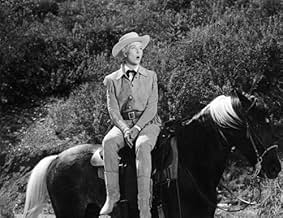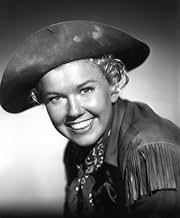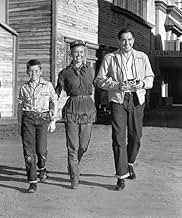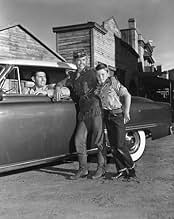IMDb-BEWERTUNG
7,2/10
11.723
IHRE BEWERTUNG
Die Geschichte von Calamity Jane, ihrem Saloon und ihrer Romanze mit Wild Bill Hickok.Die Geschichte von Calamity Jane, ihrem Saloon und ihrer Romanze mit Wild Bill Hickok.Die Geschichte von Calamity Jane, ihrem Saloon und ihrer Romanze mit Wild Bill Hickok.
- 1 Oscar gewonnen
- 2 Gewinne & 5 Nominierungen insgesamt
Allyn Ann McLerie
- Katie Brown
- (as Allyn McLerie)
Victor Adamson
- Barfly
- (Nicht genannt)
Fred Aldrich
- Chicagoan
- (Nicht genannt)
Leon Alton
- Townsman
- (Nicht genannt)
Monya Andre
- Woman at Fort Dance
- (Nicht genannt)
Beulah Archuletta
- Indian Woman in Saloon Balcony
- (Nicht genannt)
Emile Avery
- Barfly
- (Nicht genannt)
Mary Bayless
- Woman at Fort Dance
- (Nicht genannt)
George Bell
- Barfly
- (Nicht genannt)
Ray Bennett
- Officer at Fort Dance
- (Nicht genannt)
Arthur Berkeley
- Bartender
- (Nicht genannt)
Empfohlene Bewertungen
For a film that is fifty years old 'Calamity Jane' still entertains. It is usually compared unfavorably to 'Annie Get Your Gun' but I always enjoy this more. Doris Day dominates the film; dressed in buckskin or in frills, toting a gun or wielding a broom, belting out a song or doing a pratfall. Certainly a high point of her varied career. Her sheer energy is breath taking and it is no wonder that the rest of the cast seem subdued in comparison. Even Howard Keel is a bit wooden.
The songs are great, scattered through the uncomplicated plot like jewels, from the bouncy 'Deadwood Stage' to the combative 'I Can Do Without You' to the under rated 'High As A Hawk' and climaxing with the anthemic 'Secret Love'. 'A Woman's Touch' is not proof to our modern cynicism (for good reason) but it is still jolly song.
Looking back we can give other readings of the film; the cross dressing, the gay resonances, the treatment of the native Americans, the ownership of land. Which may all be true but it is basically what it is, a colourful and tuneful film that can be enjoyed time after time. It is mighty pretty and on its own terms pretty mighty.
The songs are great, scattered through the uncomplicated plot like jewels, from the bouncy 'Deadwood Stage' to the combative 'I Can Do Without You' to the under rated 'High As A Hawk' and climaxing with the anthemic 'Secret Love'. 'A Woman's Touch' is not proof to our modern cynicism (for good reason) but it is still jolly song.
Looking back we can give other readings of the film; the cross dressing, the gay resonances, the treatment of the native Americans, the ownership of land. Which may all be true but it is basically what it is, a colourful and tuneful film that can be enjoyed time after time. It is mighty pretty and on its own terms pretty mighty.
The film is marvelous, but it's been dissected to death; consequently, I can't add any comment you haven't already heard. Lovely Technicolor cinematography of the outdoor frontier and rich period costuming enhances this top-notch cornucopia of story, score, and songs- including 'The Deadwood Stage,' 'I Can Do Without You,' 'Windy City,' 'The Subject of Harry,' and 'Secret Love.' Two special moments for me are Howard Keel singing 'Higher Than A Hawk' to the portrait of Allyn McLerie, and 'A Woman's Touch,' which shows McLerie and Doris Day become sisters in solidarity. They clean the house (in fact, renovate it) while discovering Calamity's femininity at the same time. They joke, they bond, and at the end of the scene our heroine is in a dress and quite the looker. There's no shocking sexist message here; it's a musical showing how a woman gets her man. I don't think in 1953 you could've asked for more. On the other hand, most of Day's scenes with Keel are a locked-horns battle of the sexes- absolutely no question. They compliment each other beautifully- from 'I Can Do Without You', right up to their nearly romantic duet of 'The Black Hills of Dakota.' Enjoy the film again, and look between the lines- some of it is quite timeless.
Doris Day plays an unrefined tomboy who is handy with a gun and learns about refinement on the way to finding romance and singing some hit songs. If that sounds like a rehash of 1950's successful "Annie Get Your Gun", it's probably no coincidence. And both starred Howard Keel as the male lead.
Even if "Calamity Jane" can't match the array of notable, classic tunes that "Annie Get Your Gun" boasts, it can an stand on its own as a solid musical with songs by Sammy Fain and lyrics by Paul Francis Webster. In fact, the film relies mostly on its music and the wholesomely talented Miss Day to make its mark.
Ms. Day, besides displaying her usual enthusiasm while singing the film's musical numbers, including its best song "Secret Love", also plays the role of Calamity with a physicality that deserves special praise. Not only does she adapt a carriage that rings true for a woman who tries to be manlier than any man, but she also talks the talk and performs stunts that most actresses would hesitate to consider.
The other major female character, Katie Brown, is portrayed by Allyn Ann McLerie (in only her fourth screen credit). Ms. McLerie holds her own with Doris and has a presence that seems to portend more leading roles in her future.
Fans of fifties musicals should find what they're looking for in "Calamity Jane" unless they are seeking biographical truth.
Even if "Calamity Jane" can't match the array of notable, classic tunes that "Annie Get Your Gun" boasts, it can an stand on its own as a solid musical with songs by Sammy Fain and lyrics by Paul Francis Webster. In fact, the film relies mostly on its music and the wholesomely talented Miss Day to make its mark.
Ms. Day, besides displaying her usual enthusiasm while singing the film's musical numbers, including its best song "Secret Love", also plays the role of Calamity with a physicality that deserves special praise. Not only does she adapt a carriage that rings true for a woman who tries to be manlier than any man, but she also talks the talk and performs stunts that most actresses would hesitate to consider.
The other major female character, Katie Brown, is portrayed by Allyn Ann McLerie (in only her fourth screen credit). Ms. McLerie holds her own with Doris and has a presence that seems to portend more leading roles in her future.
Fans of fifties musicals should find what they're looking for in "Calamity Jane" unless they are seeking biographical truth.
From her first appearance aboard the stagecoach, singing "Deadwood Stage," Doris Day dominates the movie in exuberantpossibly too exuberantfashion, with strong assistance from Howard Keel and his virile voice
Returning home from a visit to Chicago, Day gives her account of the "Windy City" in a song that suggests Oklahoma!'s "Kansas City" in more ways than the title Her quarrelsome duet with Wild Bill"I Can Do Without You"echoes Annie Oakley's competitive duet with Frank Butler in "Annie Get Your Gun."
But one song is all Doris Day'sand the film'svery own: walking through the countryside on a beautiful morning, Calamity realizes that she loves Bill, and in a voice exuding warmth and tender feeling, she sings the Academy Award-winning song "Secret Love."
Returning home from a visit to Chicago, Day gives her account of the "Windy City" in a song that suggests Oklahoma!'s "Kansas City" in more ways than the title Her quarrelsome duet with Wild Bill"I Can Do Without You"echoes Annie Oakley's competitive duet with Frank Butler in "Annie Get Your Gun."
But one song is all Doris Day'sand the film'svery own: walking through the countryside on a beautiful morning, Calamity realizes that she loves Bill, and in a voice exuding warmth and tender feeling, she sings the Academy Award-winning song "Secret Love."
First and foremost, CALAMITY JANE is a fun musical. The 29-year-old Doris Day thoroughly enjoys herself in the central role as a gun-totin' tomboy, the fastest draw in the city of Deadwood, South Dakota - apart from Wild Bill Hickok (Howard Keel). She demonstrates an apparently limitless capacity for telling tall stories, as well as a unique ability to ride a horse. She and Keel make a lovable double-act, especially in their song "I Can Do Without You" - which is of course completely ironic in tone. They clearly cannot do without one another, as proved at the end of the film when they celebrate their nuptials. Sammy Fain and Paul Francis Webster's score contains at least two classics, "The Deadwood Stage (Whip Crack-Away," which opens and closes the film, and "Secret Love," a typically schmaltzy Day song that topped the charts on its initial release. Yet perhaps the film's most interesting aspect today is the way in which it embodies early Fifties attitudes towards gender. Calamity Jane's decision to don male attire is perceived as something aberrant; she is tolerated by her fellow-citizens of Deadwood, but no one really takes her very seriously. It is only when she is 'educated' in feminine ways by visiting singer Katie Brown (Allyn McLerie) that she understands what her 'proper' role should be. She should accept that females (unlike males) are capricious in nature, apt to make spontaneous decisions without rhyme or reason. In a ball scene towards the end of the film, Calamity appears in a long gown, her blonde hair neatly tied at the back - the male guests stare at her in disbelief, as if they cannot believe they have a "true" woman within their midst. Calamity feels uncomfortable in the role, and returns briefly to her male attire; but when the citizens refuse to speak to her later on (punishing her for her decision to banish Katie from their town), she understands the "error" of her ways. At the film's end she wears a bridal gown and tosses her six-shooter away, in symbolic acknowledgment that she should no longer try to adopt masculine attitudes. Rather she should accept her designated role as wife and (probably) mother.
Wusstest du schon
- WissenswertesDoris Day recorded the song "Secret Love" in only one take.
- PatzerAfter leaving the ball at the fort, we cut to a shot of Calamity's bare back as she is undressing. Once she gets the dress off she is shown wearing undergarments that clearly cover most of her back.
- Zitate
[the singer is a man in drag]
Wild Bill Hickok: She ain't very good lookin'
Calamity Jane: That ain't all she ain't.
- Alternative VersionenThere is an Italian edition of this film on DVD, distributed by DNA Srl: "AMORE SOTTO COPERTA (1948) + CALAMITY JANE (Non sparare baciami, 1953)" (2 Films on a single DVD), re-edited with the contribution of film historian Riccardo Cusin. This version is also available for streaming on some platforms.
- VerbindungenFeatured in The Doris Mary Anne Kappelhoff Special (1971)
- SoundtracksThe Deadwood Stage (Whip-Crack-Away)
Written by Sammy Fain
Lyrics by Paul Francis Webster
Sung and whistled by chorus behind credits, then sung by Doris Day and chorus
Top-Auswahl
Melde dich zum Bewerten an und greife auf die Watchlist für personalisierte Empfehlungen zu.
Details
Box Office
- Weltweiter Bruttoertrag
- 9.215 $
- Laufzeit
- 1 Std. 41 Min.(101 min)
- Seitenverhältnis
- 1.37 : 1
Zu dieser Seite beitragen
Bearbeitung vorschlagen oder fehlenden Inhalt hinzufügen


































